| |
|

GUEST COLUMN
Why Abbas as peacemaker is unbelievable
By Mitchell Finkel
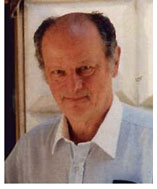 NORTH BETHESDA, Maryland—The easiest way to rewrite history is to forge a new identity for some of history’s most notorious malefactors. For Mahmoud Abbas a new identity just might wash away a lifetime of demagoguery and duplicity. Understandably, there is a need for a Palestinian leader who can sing with the angels and talk Jabberwocky to the foreign policy elites. Indeed, the entire structure of the proposed two state solution to the Arab-Israeli conflict hangs on such a leader - a leader who can undo the past and banish disbelief from the minds of the Israeli electorate. But given Mahmoud Abbas’ long and illicit association with the Ministries of Terror throughout the Middle East, Abbas remains an improbable choice for an impossible assignment. NORTH BETHESDA, Maryland—The easiest way to rewrite history is to forge a new identity for some of history’s most notorious malefactors. For Mahmoud Abbas a new identity just might wash away a lifetime of demagoguery and duplicity. Understandably, there is a need for a Palestinian leader who can sing with the angels and talk Jabberwocky to the foreign policy elites. Indeed, the entire structure of the proposed two state solution to the Arab-Israeli conflict hangs on such a leader - a leader who can undo the past and banish disbelief from the minds of the Israeli electorate. But given Mahmoud Abbas’ long and illicit association with the Ministries of Terror throughout the Middle East, Abbas remains an improbable choice for an impossible assignment.
A brief review of some of Abbas’s more memorable malefactions should give us a better sense of the man. Suppose we begin with his doctoral dissertation (Patrice Lumumba University, Moscow, 1982). The entire dissertation reads more like an ideological driven diatribe than a serious attempt at scholarship. The central argument of his thesis is that the Zionist pushed the number of innocents that were devoured by the Holocaust well beyond the limits of plausibility. More than that, his dissertation asserts that the Zionists openly and flagrantly colluded with the Nazis throughout the 30's and 40's. Mahmoud Abbas has never retracted any of these monstrous allegations.
In an interview with the Arab-Israeli daily, Kul Al-Arab (8/25/00) Abbas said, “They claim that they had a Temple here 2,000 years ago. I challenge that claim.” Again, Abbas has never retracted that statement. Fatah, the dominant political party in the West Bank, was co-founded in 1959 by its current chairman, Mahmoud Abbas. Fatah may not have a state but it does have a Charter and its Charter clearly particularizes the rights and obligations of its denizens. Jihad, for example, is defined as a sacred right and the eradication of the Jewish State - a solemn obligation. The Charter has never been revoked.
For a supposed “moderate’, Abbas seems to be well connected to the Middle East terror network. A day after Saddam Hussein sought his final absolution in a hangman’s noose, a tristful Abbas let some of his pent-up sympathies for the tyrant from Tikrit to bubble up. According to Abbas, “Saddam Hussein entered history as a symbol of Pan-Arab nationalism” (Palestine Radio and Television, 12/31/06). According to the Palestinian daily, Al-Hayat Al-Judida, Mahmoud Abbas sent the following salutation to Mahmoud Ahmadinejad: “On behalf of the Palestinian people, I wish to extend our warmest and most heartfelt best wishes. As you memorialize the Glorious Victory of the Great Islamic Revolution we pray that Allah will grant you and your people continued progress and prosperity. In a moment of candor, Abbas and Khaled Mashaal both agreed that “there are no differences over our objectives.” Mashaal is headquartered in Damascus and is Hamas’s chief military and political strategist. Then there is this. At the Aqaba Summit (6/3/03), the United States delegation urged Abbas to recognize the Jewishness of the Jewish State. Abbas refused.
In the throes of the Second Lebanon War, a jubilant Mahmoud Abbas began to believe that the doggedness exhibited by Hizbullah had established a new paradigm in the Arab-Israeli conflict. Hizbullah, Abbas asserted, has become “a source of pride and has set an example for Arab resistance” (Jerusalem Post, 9/6/06). But Hizbullah is not the only source of pride for Abbas. There are the Brigades. The al-Aqsa Martyrs Brigades are by all counts the most virulent faction within Fatah’s hierarchy. As if to underscore the obvious, in May of 2002 the State Department concluded that the Brigades were indeed a terrorist organization. Writing in the Wall Street Journal (6/20/07), Michael Oren noted that Abbas has “never disavowed the al-Aqsa Martyrs Brigades. Commenting on the steady stream of promises to end the ongoing reign of terror, Avi Dichter, Israel’s Minister of Public Security, reminded us that “for the past seven years, the Palestinian Authority hasn’t lifted a finger to stop terrorism” (Haaretz,10/2/07). Evidently, Abbas is as adept at making promises as he is in breaking them.
Another example should make the point. This past summer, two congressional delegations meet with Abbas. Abbas was quite emphatic. The rift between Fatah and Hamas, they were told, was beyond repair. A week or so later, Abbas meet with the visiting Japanese Foreign Minister, Taro Aso. Without a twinge of self-consciousness, Abbas told the Foreign Minister that “the split with Hamas is temporary and will be removed.” So what are we to make of all this? Hani Al-Hasan, a member of Fatah’s Central Committee, has given us a rare insight into the thinking of Mahmoud Abbas and his Palestinian Authority. On one hand the Authority is prepared to let the “armed struggle do the sowing” and on the other hand there is the expectation that ‘the political struggle will do the reaping.”
In an interview carried by Agence- France Presse (11/11/05), Abbas vowed to “continue on the path of our late president (Yasser Arafat) until we fulfill all of his dreams.” In another interview with Italy’s most evocative journalist, Oriana Fallachi asked Arafat, “Are you interested in peace”? “No”! bristled Abbas “We don’t want peace. We want war, victory. Peace for us means the destruction of Israel” ( Midstream, July/August 2007). Just yesterday, or so it seems, Abbas was Arafat’s faithful deputy . And today, today Abbas is hailed as a moderate, an emissary of peace. That synthetic conversion will probably be remembered as the greatest hoax of our time.
Let me leave you with the following cautionary note: “Woe unto them that speak of evil as good,and good as evil” (Isaiah, 5:2).
Finkel, a former viola player with the National Symphony Orchestra, is a member of the national board of directors of the Zionist Organization of America

Scholars-in-residence
program
Presentations are free; kosher meals moderately priced
● Rabbi
Motti Berger, founder of "Jews for Judaism," Nov. 16-17
● Rabbi
Yakov Horowitz, founder, Project Y.E.S. (Youth Enrichment Services)
for
Agudath Israel, Jan. 4-5
● Rabbi Ari
Kahn, director, Foreign Student Programs,
Bar Ilan University, Israel, Feb.
22-23
Call us for details at (619)
287-9890 |
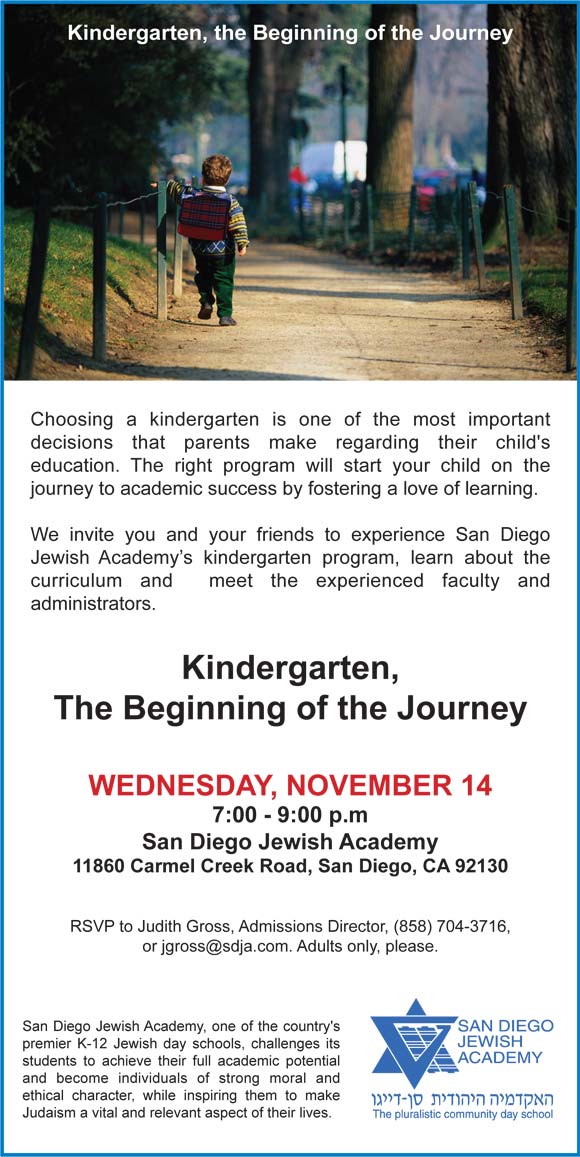

GUEST COLUMN
What about extending tolerance towards the Orthodox members of your family?
By Michoel Stern
MONSEY, New York—Often when the word "intolerance" is invoked within the Jewish world regarding interpersonal relationships, the mind automatically congers up imagery of Orthodox protests to a plethora of actions (or inactions) and positions demonstrated by their non-Orthodox brethren. This picture comes into place not only on a group level, but a personal level as
well.
However, as the adage goes: "There are two sides to every story." While I do not deny that "Orthodox intolerance" exists, I would like to focus on the often ignored observation of the reality that there is often not only an intolerance for Orthodox Judaism among some non-Orthodox Jews, but also a close-minded view regarding the adherents of Orthodoxy itself.
Taking into consideration that I was involved with various pluralistic movements in the past, and at one time being an active member of the Reform, and later the Conservative youth groups in my community, I can empathize with the thoughts and feelings that people have for the convictions of Orthodoxy. With this in mind, please understand that while I may make some points and observations that may come across as accusatory in tone, the prime motive I have behind my
comments is to help foster mutual understanding, and any comments perceived as negative are necessary in order to help convey the message.
The goal that I hope to achieve here is to reveal the "other side of the coin" that is often neglected (often not on purpose, but by ignorance) by society at large, which are the feelings and perspectives of the Orthodox community regarding our interaction with Jews of different beliefs and convictions (especially the Newly-Orthodox and their Non-Orthodox relatives). I also want to analyze some ideas on how to minimize some of the miscommunications, and pain that often is the outcome of these misunderstandings.
A friend of mine once told me a story regarding him and his family: It was his grandmother's birthday and the family wanted to celebrate the occasion at a restaurant. Being the only one in his family that keeps kosher, he suggested they choose from the whole "smorgasbord" of kosher facilities in New York (i.e. not a matter of convenience, but one of, well, taste).
However, his family insisted they eat at a non-kosher Japanese restaurant. One more detail, he was expected to be one of the hosts! His family was disappointed that he declined the offer, even though he forewarned them that he could not participate due to religious beliefs. I am not relating this story to gain sympathy for the many people who often can not attend family functions because their family failed to consider if they would be able to attend an event with the circumstances in mind. The question I am drawing out from this story (and the many like it) is that given the liberal/non-Orthodox pride in pluralism, where is the tolerance and sensitivity towards people attempting to live according to their beliefs and convictions ... which causes many Jews, who are otherwise extremely non-judgmental and perceptive to have on "blinders" to the situation of their Orthodox family and friends who due to Torah convictions are unable to always "go with the flow"?
I would now like to address what I understand to be two of the main root causes of much misunderstanding and strife. The first cause is that often non-Orthodox Jews have a strong sense of "Jewish pride" and feel that when Orthodox friends or family can't participate fully (or at all) in an occasion or event that their Judaism is being challenged. Therefore it is not hard to understand why they feel that they are being judged. The second core issue is that non-Orthodox people have a hard time relating to the concept of a "Divinely commanded" lifestyle and interpret the actions (or inactions) of their Orthodox relative as trying to separate himself or herself from the family.
The judgment factor: It is no great secret that Orthodox Jews desire that their Jewish family and
friends share the same values and observances as themselves, and it is also no great surprise that most non-Orthodox Jews feel comfortable where they are "in their Judaism." When an Orthodox Jew declines to be involved in matters that go against halachah, this is a "direct assault" on the comfort zone of the non-Orthodox friend/relative. Indeed, there is no getting around it; the Orthodox Jew by the very nature of what the Torah demands of him (or her) is not allowed to view certain actions and beliefs as appropriate. Because of this reality, many non-Orthodox Jews feel threatened and are put on the defense. This explains why many times non-Orthodox family members are oblivious to the feelings and concerns of an Orthodox family member who can't come to a gathering. As the author, Azriela Jaffe, pointed out to me, when people are feeling angry, judged and
threatened, compassion and sensitivity are not compatible feelings.
I would like to suggest an outlook that should appease those who feel judged by their Orthodox
relative/friend. When an Orthodox Jew speaks about something that is incompatible with Judaism, he or she is not judging the person, but rather the action or the idea. To make the mistake of thinking the rejection of a person's actions/philosophy is synonymous with the rejection of the person who is
subscribing to them is an easy mistake to make. This is why making the differentiation is essential for
harmonious relationships.
The fanatic factor: One of the requests most often made of Orthodox people from their non-Orthodox family/friends is, "can't you just make an exception?" Many times it is presumed that Orthodox people are apathetic to their family's needs, or worse, get some sort of pleasure from not being able to do what is being requested. It is as if people think their Orthodox relative or friend really could make an exception, but for some inexplicable reason refuses to do so. They can fill in the blank with just about everything, except for the possibility that their Orthodox relative is doing so because his or her religion requires it. This idea (for most cases) could not be farther from the truth.
Many times, in resisting acquiescing to demands made of them, Orthodox Jews experience many emotional hardships. The reaction of causing pain to a loved one is often not lessened even if the pain that the loved one is feeling is self-inflicted, and beyond control of the Orthodox family member. What many non-Orthodox people have a hard time relating to is the concept that the
rules are accepted as a Divine command, and are not some self-imposed habits of a person in an expression of individuality.
A perspective that should help relationships with Orthodox family members is: that indeed the Orthodox family members would love to be able to go to any restaurant that their families choose, however they can not, because to them the Torah is the expression of G-d's will for them, a will
that it is imperative they not deviate from. The reality of the Orthodox Jew is what is expressed in
the Torah, so they are not flippantly able to "just make an exception."
The best option is to go over with the Orthodox family member how s/he would be able to attend a family gathering ahead of time. Sensitivity and thinking ahead are crucial to make sure as many
people are accommodated and as comfortable as possible.
I wanted to articulate these ideas in a concise form to benefit the widest possible audience; but for thosewho would like to read more, a great resource is the book What Do You Mean You Can't Eat In My Home? by Azriela Jaffe. Any comments or questions may be addressed to me at: Michoel_stern@yahoo.com
Stern is a rabbinical student at Yeshiva Kol Yaakov in Monsey. Rabbi Leib Tropper is the Rosh Yeshiva.


THE VIEW FROM JINSA
Army officer reflects on Veteran's Day about his assignment in the Iraq war
By Shoshana Bryen
WASHINGTON, D.C—The following is from Lieutenant Colonel Charles Grinnell, an Army Reservist who has served three years in Iraq and is currently the head of the Central Criminal Court of Iraq. We send it out with deepest appreciation for all of our veterans and their families.
By Lt. Col. Charles Grinnell
BAGHDAD—In the recent past, each generation has been asked to step forward in times of great need. This is the time for my generation to stand when others kneel, to step up when others step back, to move forward as others retreat. For we hear the calling of our forefathers who knew that freedom, liberty and justice were neither simply words nor a commonly available commodity. They are debts for which a price, every once in a while, must be paid.
On this day of remembrance, do not think about the merits of this extended war, the loss of life and limb, the sacrifices of families or the tears of a nation profoundly effected by a foreign attack upon its shores.
Do not wonder if the money is well spent, or the hot desolate land of a foreign country is worth the blood of our nation's best, or what we will get in exchange for the billions of dollars that this war has cost.
Do not pretend to fully comprehend what it is like to be an Iraqi and quietly thank the troops for the life-giving safety and security they bring to your neighborhood for fear that such a show of thanks would cost you your life. Or how that simple act reaches into our very souls.
Everyday we hear and see the evidence of an enemy that wakes to a dawn with a desire to kill not only every American but also our freedom and way of life. We hear them speak the lies and untruths told by their leaders and wonder how easily they are willing to die to kill us. With three tours of duty and from these experiences with both the Iraqi people and our enemy I know this:
It is better to fight a war on any shore but our own... as was starkly revealed by 9-11. Make no mistake about it, if we were not here, they would be there.
We fight this battle not for ourselves but for our children and a way of life, for if we lose this battle we fear a loss of the freedoms some so easily dismiss as commonplace. It is no good to have money if you don't have liberty, and in those areas once controlled by the enemy they had no justice or freedom. Every month more Iraqis die than Americans die in a year, so they are neither sitting back nor failing to pay an ultimate price in the war for freedom.
Most people spend a lifetime looking to say they made a difference, American troops return home knowing they made a difference.
In the end, all we really need is a simple, silent "thank you" and to shed just one tear, on this one day, for our families who have worried, endured the pain of helplessness and lost a piece of their soul in payment too for the concepts we hold so dear.
As for us... we know our generation did not falter when our time came to pay. When we return home we need your support, to just hold us for a moment, so we close our eyes and breathe in all our freedoms like it was our last meal, healing each of our souls that have been touched and at times scarred by the rigors of payment.
Bryen is director of special projects for the Jewish Institute for National Security Affairs (JINSA)


FORUM
Colonialism the culprit in Pakistan
and elsewhere in unstable world
By Peter Garas
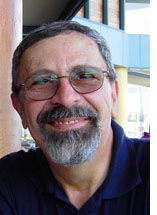 CANBERRA, AUSTRALIA—Re: Shoshana Bryen's article yesterday titled "Pakistan has neither a racial nor philosophical identity to help unify it": CANBERRA, AUSTRALIA—Re: Shoshana Bryen's article yesterday titled "Pakistan has neither a racial nor philosophical identity to help unify it":
"Pakistan" is an interesting name to begin with. It contains within it the affix "stan" which usually seems to mean "the land of" in all the other instances when it is used - for example Kurdistan, Afghanistan, Khazakstan, Kyrgyzstan etc. ie the land of the Kurds or the land of the Afghans and so on.
We know for a fact that there are no people who are called "Paki" and hence the use of the derogatory word "Pakis" in British slang is quite an interesting one especially as the word Paki in Urdu refers to purity or cleanliness. Whether this choice of name was meant to cast aspersions on those who remained in India is a moot point.
Be that as it may - it is also interesting to read from Ms Bryen that: "nationalist leaders chose the lowest common denominators: pan-Islamic ideology and the threat of India, giving enormous power to religious and military elites who over time became intertwined and linked by their desire for power."
My understanding of the history of events on what has been referred to as the Indian Sub-continent is that during British colonial rule in India, there were considerable difficulties as national ethnic and religious groups fought for power and influence within the Raj.
These resulted in a number of streams of rhetoric - not least of which was Hindu fears of Islamic militants and of course Muslim fears of Hindu militants and British fears of anyone who was not a coloniser from the UK.
It was NOT nationalists who chose a lowest common denominator, but rather the British who eventually made a divide between the Hindu majority that was pushing to have a country of its own and get rid of British colonial rule and the Muslim minority who did not wish to be subjugated by either the British or the Hindus and so wanted a place of their own.
As seems to have been the case with the end of British colonialism virtually everywhere, the eventual carve up was not appreciated by anyone.
Hence the wars between the two countries over the years since the second world war.
Similar "equitable divisions" that appear to be the legacy of colonial rule have come back to haunt the world in Afghanistan, Syria, Lebanon, Palestine/ Israel and there are also a few interesting injustices that still abound in what is now Saudi Arabia, Yemen and we won't even venture into the more dangerous territories of Africa proper that are the remnants of colonial exploitation.
Perhaps Ms. Bryen may wish to focus in her comments on the history of European colonialism in general and what bloody price we are all paying today for those empires that started in Europe and then gradually engulfed the world leaving some interesting legacies in their wake.
"Democracy" is a term that has its history as we all know based on Greek institutions from another age. What's fascinating is that within ancient Greece there were citizens and slaves all living within a "democracy" where there was one rule for the citizens and another for the slaves. So it depends does it not which version of democracy we wish to consider in Pakistan or indeed elsewhere in the world. As we reveal yet again, societies in the world where there are "haves" and "have nots" - those who have want to retain their status quo and those who "have not" wish to gain the status of those who currently have.
What a surprise!


WHAT'S GOOD TO EAT IN SAN DIEGO
Culinary stars gather for San Diego Bay Wine and Food Festival
By Lynne Thrope
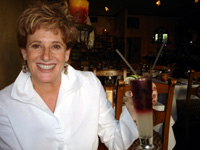 SAN DIEGO—It’s finally here in our very own backyard! And it begins this week. The San Diego Bay Wine & Food Festival is an international showcase of the world's premier wine and spirits, chefs and culinary personalities, and gourmet foods is the largest wine and culinary event in Southern California. SAN DIEGO—It’s finally here in our very own backyard! And it begins this week. The San Diego Bay Wine & Food Festival is an international showcase of the world's premier wine and spirits, chefs and culinary personalities, and gourmet foods is the largest wine and culinary event in Southern California.
This culinary extravaganza runs from November 14-18, 2007 at various locations around San Diego including The Embarcadero behind Seaport Village, Macy’s Cooking School, San Diego Wine and Culinary Center, aboard the Hornblower’s Inspiration, and the Ivy Hotel. The event auctions benefit the American Institute of Wine & Food culinary arts scholarship program.
Over 700 wines and spirits, 60 of San Diego’s top fine dining restaurants and 30 gourmet food companies will participate in this year’s festival. The five-day festival features champagne and wine tasting seminars, cooking classes by award-winning chefs, cookbook signings, and an oil tasting in which attendees take part in a people's choice judging from gourmet olive oil producers and learn the fine art and nuances of tasting olive oil from the experts.
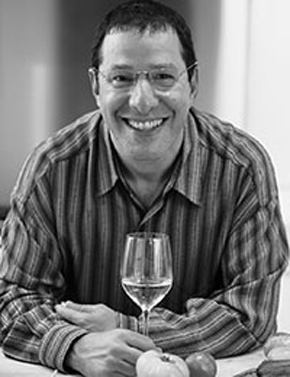 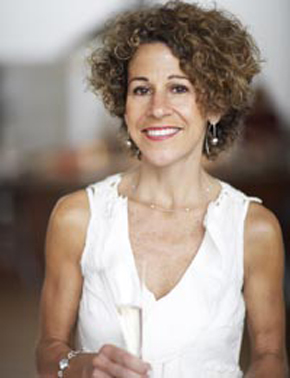
Evan Goldstein, Laura Werlin
The festival culminates on Saturday November 17 at the star-studded Grand Tasting Event and Fine Wine/Lifestyle Auction complete with dueling chef demonstration stages, celebrity cookbook signing tents, Cost Plus World Market entertainment tent, and much, much more. Also on the 17th don’t miss the opportunity of meeting Evan Goldstein, renowned Master sommelier, teacher and author of Five Star Service: Your Guide to Hospitality Excellence and Perfect Pairings: A Master Sommelier’s Practical Advice for Partnering Wine with Food. At his tent Goldstein will share his "Top Ten Wine and Chocolate Pointers for Ghiradelli Intense Dark Chocolate."
In the world of cheese, James Beard award-winning author and authority on the American varieties Laura Werlin will be teaching a class titled "Laura Werlin’s Cheese Essentials"at the San Diego Wine & Culinary Center on Frida,y November 16 from 12:00 – 1:30pm. During the class Werlin will take participants through a tasting of the eight basic styles of cheese and will explain how those eight styles are key to understanding cheese choices. Then, she will lead a cheese and wine pairing journey to help dinner planners decide what cheeses to buy and what to serve them with.
Producers of the San Diego Bay Wine & Food Festival are turning up the heat this year with the launch of a high-stakes culinary competition to handsomely reward one San Diego County-based chef with up to $50,000 in cash and prizes.
“We are proud of the creativity and artistry exhibited by the chefs involved in our Festival and want to showcase, and reward them in a really big way,” said Michelle Metter, the Festival’s co-producer. “It’s not easy for these chefs to prepare amazing food for thousands of people and have each dish
taste just as good as the one before. This competition will spotlight those chefs who, despite the challenges, wow our judges through innovative, flavorful, consistent cuisine.”
The prize package awarded to the “Chef of the Fest” includes a jaw-dropping vacation of a lifetime for two to the ultra exclusive Turtle Island Fiji including round-trip airfare with Air Pacific, a professional range provided by US Foodservice, magazine exposure in Dining Out and San Diego
Magazines, $3,000 in cash, and a Tommy Bahama Rum Gift Basket. Additionally, the “Chef of the Fest” winner will return to the 5th Annual San Diego Bay Wine & Food Festival in 2008 as one of the headlining chefs with his or her own cooking class and appearances during the Grand Tasting.
The competition, is open to 60 professional San Diego County chefs. Each chef selects from one of five categories including Raw Foods, Meats, Poultry, Seafood/Fish, and Desserts and is then judged by a team of celebrity chefs, educators, members of the food and wine media, and industry professionals. Judges include Werlin along with Saveur Magazine Editors James Oseland and Paul Lucaks; San Diego Union Tribune Food Contributor Maria Hunt, San Diego Magazine Publisher, Maureen Sullivan; Culinary Educator, Chef Vikki Nulman; Restaurant Hospitality Magazine Reporter, Libby Platus and 12 others. The “Chef of the Fest” winner will be announced during the Festival’s Grand Tasting on November 17.
For the complete schedule of events, tickets, and list of wineries and winemakers, participating chefs, and restaurants, go to www.worldofwineevents.com or call (619) 342-7337.
Lynne Thrope can be contacted at www.TheReadingRoom.net


PEOPLE OF THE BOOKS
Dreams imagined by Freud descendant
LOVE FALLS by Esther Freud (New York: Harper Perennial: 2007), 279 pages, $13.95
By Donald H. Harrison
 SAN DIEGO—There was a remembered dream and a forgotten dream in the novel, Love Falls, and ordinarily we might not pay much attention to either. But author Esther Freud is the great-granddaughter of Sigmund Freud, and so it’s intriguing to wonder what the old father of psychiatry might have thought of his descendant’s reveries. SAN DIEGO—There was a remembered dream and a forgotten dream in the novel, Love Falls, and ordinarily we might not pay much attention to either. But author Esther Freud is the great-granddaughter of Sigmund Freud, and so it’s intriguing to wonder what the old father of psychiatry might have thought of his descendant’s reveries.
Lara, the protagonist, is a 17-year-old British teenager on holiday in Italy during the time immediately preceding and following the Royal Wedding of Prince Charles and Lady Di. Having been told by knowledgeable royal-watchers that Charles was not permitted to marry his true love, the teenager “dreamt of Charles and his black Jamaican girlfriend searching for his trousers in her room. They giggled and flirted and made lustful, lascivious comments, somewhere between Ray Cooney and Macbeth, and she had to hide under the covers for fear they would fall on to her bed.”
 Perhaps this dream represents Lara’s sexual longing coupled with her fear of intimacy? Perhaps this dream represents Lara’s sexual longing coupled with her fear of intimacy?
Hmmm, one can imagine great-grandpa saying, why do you imagine Prince Charles' true love to be Jamaican? Perhaps sex, like inter-racial sexual coupling, is both taboo and alluring?
The non-dream comes after Lara meets a young man, Kip, to whom she is attracted, and a lecherous, married man, Roland, who pushes her into a swimming pool—the first of several unwanted physical advances.
“She woke up in the early hours of the morning, her heart racing, the terror of an unremembered dream pulsing through her blood. It’s just because I’m too hot, she told herself, unpeeling the jumper, and she got out of bed and went to the window for air.”
Hmmm, great-grandpa might say, obviously something is being repressed here. But is it the terror that Roland stirs within Lara, or is it the powerful response she feels with in her body to Kip, who by the way is the son of a British lord?
Hmmm and more hmmmm.
Although Lara’s Jewish father is a former refugee from the Holocaust—who is acquainted with these lordly types because they helped raise him after he was whisked as a child to the safety of Britain—this theme is so muted, it provides very little for us as Jews to reflect upon.
One suspects that Lara’s father going on vacation to Italy to be with his now grown British playmates simply was a device to bring together a poor-to-middle income girl with a fabulously wealthy upper class British young man. That’s a pity really. A possible story line with some depth was squandered for a coming-of-age sexual awakening story that could have been just as easily told without any reference to the Holocaust.
< BACK TO TOP


SAN DIEGO JEWISH WORLD
THE WEEK IN REVIEW
MONDAY, NOVEMBER 12
Shoshana Bryen in Washington, D.C.: Pakistan has neither a racial nor philosophical identity to help unify it.
Natasha Josefowitz in La Jolla, California: We share our territorialism with the lower orders of animal life; can we transcend it?
Joe Naiman in Lakeside, California: Unusual Suspect gladdens a Jewish family
Sheila Orysiek in San Diego: Expanding our view of Veteran's Day
Ira Sharkansy in Jerusalem: 'Right of return' and 'undivided Jerusalem' jeopardize any bargain at Annapolis
SUNDAY, NOVEMBER 11
Sandy Golden in La Jolla, California: "Viorst has kept a generation laughing"
Donald H. Harrison in Encinitas, California: "Hall of History at Seacrest Village recalls the residents of 54th Street Hebrew Home"
Rabbi Baruch Lederman in San Diego: "Why Baruch keeps the kippah on his head"
Joel A. Moskowitz, MD and Arlene Moskowitz, JD in La Jolla, California: "U.S. standing in the world depends upon clear objectives—Dennis Ross"
Rabbi Leonard Rosenthal in San Diego: "Jacob and Esau:Nature over nurture"
Melanie Rubin in San Diego: "San Diego Grandpa and Israeli Native"
Larry Zeiger in San Diego:"Lars finds himself a girl in bizarre movie that will make you laugh—and also think"
Publishers tell changes in format and frequency for San Diego Jewish World
THURSDAY, NOVEMBER 8
Gary Acheatel in Ashland, Oregon: "Carter, Walt, Mearsheimer fail 3-D test in their assessments of Arab-Israeli conflict"
Carol Davis in Vista, California: 'Argentina proves a crackling refuge for European family in The Magic Fire'
Ira Sharkansky in Jerusalem: "U.S. policy-makers have a record of mistakes in U.S.; is Israel next?"
Photo Story: JFS relocates its senior center to Congregation Beth Israel
WEDNESDAY, NOVEMBER 7
Sherry Berlin in La Jolla, California: "Pre-school playground was a wonderful venue for teaching at Jewish Book Fair"
Garry Fabian in Melbourne, Australia: "Australian children enlisted in battle against global warming"... "Another rating system for political candidates: how do their websites compare with each others?" ... "South African rabbi visits Queensland" ... Israeli ambassador's comments may have been 'reason' for vandalism of Jewish cemetery" ... "Same-sex unions attacked by Orthodox rabbi."
Joel A. Moskowitz, MD and Arlene S. Moskowitz, JD in La Jolla, California: "Audience kvells over Tony Kushner"
TUESDAY, NOVEMBER 6
Donald H. Harrison in La Jolla, California: "An internationalist makes Israel his cause."
J. Zel Lurie in Delray Beach, Florida: "Not only enemies but some would-be friends believe the Jewish stereotypes."
Joel A. Moskowitz, M.D. and Arlene S. Moskowitz, J.D in La Jolla, California: "How Jews became Germans: they didn't."
< BACK TO TOP
|
|

